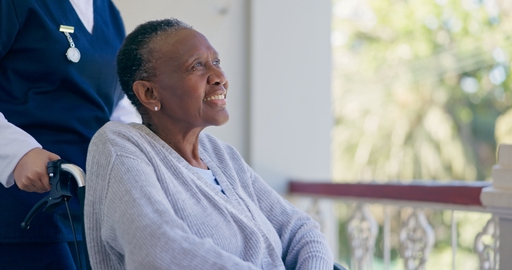
Palliative care vs end-of-life-care
When a loved one is living with a serious or life-limiting illness, the language used around the care they can receive can sometimes feel confusing, especially at what is a very emotional time. Terms like palliative care and end-of-life care are often used interchangeably, but they are not the same. Understanding the differences can help families make informed, compassionate choices at every stage of the journey.
In this article, we take a closer look at what each type of care involves, who it is for, and when palliative care transitions into end-of-life care.

What is palliative care?
Palliative care is a specialist form of care that focuses on enhancing quality of life for individuals living with a serious illness. It is designed to provide relief from pain and other symptoms, while also offering emotional, psychological, and spiritual support.
Importantly, palliative care can be introduced at any stage of an illness - not just towards the end of life. It can be offered alongside other treatments and can continue for months or even years, depending on the individual’s condition.
Palliative care is holistic in nature, meaning it sees the person as a whole - not just their diagnosis. It considers physical needs alongside emotional wellbeing, personal preferences, and family involvement. Palliative care may take place in a hospice, a hospital, a care home or nursing home, or in the person’s own home
What is end-of-life care?
End-of-life care is a specific stage of palliative care, provided when a person is nearing the final months, weeks, or days of life. At this stage, the focus shifts entirely to comfort, dignity, and ensuring that the individual’s final moments are as peaceful and supported as possible.
Care is tailored to minimise pain, manage symptoms, and provide emotional reassurance - not only for the person receiving care, but for those closest to them. It also often includes support with practical matters such as advance planning, spiritual needs, and bereavement care for loved ones.


Who is palliative care for?
Palliative care is for anyone living with life-limiting or terminal illness that impacts their daily life or causes on-going discomfort. This includes conditions such as cancer, heart failure, COPD, motor neurone disease, Parkinson’s disease, and other progressive illnesses.
It may be introduced at the point of diagnosis, during treatment, or as the illness progresses. Some individuals receive palliative care for an extended period, while continuing to lead fulfilling lives with the right support in place.
Whether or not the person is likely to pass away from their condition, palliative care may be offered as a way to help manage their pain relief, ease their symptoms, and improve their quality of life.
Who is end-of-life care for?
End-of-life care is designed for people approaching the final months or weeks of their life, and requires specialist care to ensure their pain is managed and they can pass peacefully and with dignity. End-of-life care is typically offered to those with a life expectancy of less than 12 months, according to the NHS.
At this point, curative treatment is no longer the focus, and care revolves around keeping the person as comfortable and settled as possible. The emphasis is on dignity, choice, and ensuring the person’s wishes are upheld in their final days.
Those with terminal illnesses such as advanced types of cancer, Alzeimers, motor neurone disease or heart disease will often receive end-of-life care.

What are the key differences between palliative and end-of-life care?
While palliative care and end-of-life care share many of the same values - such as comfort, dignity, and holistic support - there are important differences in their timing, purpose, and approach.

Timing and duration
Palliative care can begin at any stage of a serious or life-limiting illness and may be provided over months or even years. It is not dependent on a terminal prognosis and is often offered alongside treatments aimed at controlling the illness. In contrast, end-of-life care is provided when a person is nearing the final stage of their life - typically within the last 12 months, though this may be shorter or occasionally longer depending on the individual. It represents a shift in focus towards preparation for the final phase of life.
Goals of care
The primary aim of palliative care is to manage symptoms, relieve discomfort, and improve overall quality of life, whilst still supporting the individual to live as independently as possible. End-of-life care, on the other hand, is focused specifically on ensuring a person’s final days, weeks, or months are comfortable, peaceful and supported. It is about easing pain and distress, honouring a person’s wishes, and helping them approach the end-of-life with dignity and reassurance.


Clinical treatment
Palliative care can be delivered alongside treatment intended to slow the progression of an illness, such as chemotherapy or radiotherapy. With end-of-life care, active treatment is no longer part of the care plan. Instead, the focus is on symptom control, emotional support, and creating a calm, peaceful environment.
Decision-making and planning
In the early stages of palliative care, conversations may centre around treatment choices and how to maintain independence. As a person moves towards end-of-life care, discussions may naturally turn towards their wishes for care in the final days - such as where they would like to be cared for, who they would like present, and any spiritual or cultural considerations. Advance planning tools, such as the Advance Decision to Refuse Treatment or ReSPECT form, may also be introduced at this stage.


Life expectancy
End-of-life care is typically provided to those with a terminal illness, who are in the final months or weeks of their life. Those receiving end-of-life care would usually have a life expectancy of 12 months or less. On the other hand, palliative care can be offered at any point of someone’s serious illness, regardless of their life expectancy.
When does palliative care become end-of-life care?
There is no single moment when palliative care turns into end-of-life care - rather, it is a natural transition based on how the individual's condition progresses.
As symptoms become more complex or difficult to manage, and as treatment options change, the care team may begin to gently shift the focus from longer-term support to planning for the final phase of life. This transition is handled with sensitivity and care, involving open conversations with the individual and their family to ensure that their preferences are respected and upheld.

What our clients say
"Consultus Care allowed us to keep our Mum at home following a fall and a hip break. This meant that she had a really good quality of life; her friends could visit her easily. It made a huge difference to her to be in her own surroundings.
The quality of care was excellent throughout."
Alison
Why choose Consultus Care and Nursing?
One of the longest-established and most trusted providers
Founded in 1962, we have always been innovators in live-in care and live-in nursing. With over 60 years’ experience, we are one of the country’s longest-established, most highly recommended and experienced providers.
Unrivalled choice and control over your care
We understand that every person’s needs are different and every family’s situation is unique. With our choice of fully managed live-in care and nursing, and our introductory service, we offer more flexibility and personalisation than any other provider.
Highly trained nurses and carers
We are nationally recognised for the quality of our nurses and carers. With market-leading training, delivered at our own, multi-award-winning training centre (a Skills for Care Centre of Excellence), they provide exemplary, compassionate care tailored to individual needs, offering total peace of mind for clients and their families.
Expert care and support, dedicated to you
Our Care Consultants oversee our nursing and managed care services supporting only a small number of families. This means our service is truly personal, with unrivalled support and continuity of care. Reassurance that we are there when you need us most.
Family-founded, family-owned
We continue to be a family-owned and family-managed business. The largest wholly family-owned live-in care provider in the UK, we focus on what our clients and their families need from a high-quality care service, not on meeting investors’ expectations.
How to arrange live-in care
Speak to a Care Advisor
Our friendly, expert Care Advisors are here to guide you through your options, answer your important questions, whilst providing support along the way.
Care assessment
If you would like our managed live-in care service, a Care Consultant local to you, will complete a free assessment of your needs in your home.
Care starts
A fully trained carer will be carefully matched to meet your needs, and will start to provide our high-quality service in your home.
Live-in nursing FAQs
Live-in nursing is specialist form of care and support, where a registered nurse resides in your home to provide one-to-one medical care around-the-clock. Our live-in nursing service means you can avoid a prolonged stay in hospital or a disruptive move to a nursing home or hospice to get the specialist care you need. Our live-in nurses are qualified and trained to provide support with medical conditions and chronic health concerns, recovery and rehabilitation following surgery, and sensitive and compassionate end-of-life care.
Live-in nursing is suitable for individuals, or couples with complex medical conditions, such as:
Acute medical needs requiring clinical supervision
Post-surgical care and rehabilitation
Chronic illness and disease management
Neurological conditions, such as dementia and Parkinson’s
Palliative and end-of-life care
Recovery support following a hospital stay to transition back into daily life
All our nurses are thoroughly vetted through a rigorous process, including:
Right-to-Work and an enhanced Disclosure and Barring Service (DBS) checks
Registration verification with the Nursing and Midwifery Council (NMC)
Employment reference checks to ensure a minimum or three years post-registration experience in an acute, community or palliative care setting
Face-to-face interviews to assess suitability, professionalism and compassion.
Whilst we provide you with a couple of nurse profiles to review, our experienced Nurse Consultants will recommend the best match based on your specific needs and preferences. We have over 60 years’ experience of matching suitable nurses that meet our clients’ needs to ensure they have the right level of nursing care.
A live-in nurse typically works from 8am to 8pm, with a two-hour break during the day.
A live-in nurse can provide up to two-night calls per night, which are chargeable. If you require more frequent nighttime assistance, your dedicated Nurse Consultant will review your nursing needs, and we may recommend a dedicated night carer, or nurse.
You’ll need to provide a private bedroom with basic amenities, including a bed and somewhere to store their clothes. They need to have access to a bathroom, but this does not need to be a dedicated bathroom. Nurses will also need access to WIFI to enable them to communicate and complete administration tasks. Most families provide food for our nurse, but if this is not possible, we ask for an £8 per day allowance if the nurse needs to make their own provision.
Our live-in nursing service is highly flexible. Care plans are regularly reviewed by your nurse and dedicated Nurse Consultant to ensure it accurately reflects the clinical support you require working closely with healthcare professionals involved in your care.
Nurses are trained to respond effectively to emergencies, such as contacting emergency services, notifying family members, and following agreed protocols to ensure your safety. Our live-in nursing service is fully managed, so you have around-the-clock emergency support from our office-based nursing team.
The minimum booking for our live-in nursing service is four days.
Live-in nursing can typically be arranged within 24-48 hours, depending on the complexity of your needs.
Live-in nursing care costs from £2,780 per week, subject to an assessment of you or your loved one’s needs.
When considering funding live-in nursing, it is worth noting that in the UK, healthcare is provided free at the point of delivery. If you need live-in nursing at home due to an identified health care need, you may be eligible for NHS Continuing Healthcare Funding. This funding is managed and provided by your local Integrated Care Board (ICB), formerly the Clinical Commissioning Group (CCG). This funding covers the treatment, management or prevention of diseases, illnesses, injuries or disabilities, as well as aftercare those living with these conditions. At Consultus Care and Nursing, our Nursing Co-ordinators are here to guide you through your options, so you can make the right choice for you or your loved one.
It starts with a friendly discussion with a member of our experienced Care Advisory team who will talk through your requirements and expectations and guide you as to the suitability of our services. Should you wish to proceed, a Nurse Co-ordinator will discuss with you, and your family and other healthcare professionals involved in your care, your specific healthcare needs to ensure we match you with the perfect nurse to meet your needs. Once the contractual paperwork is concluded a service start date is agreed.
Looking for care?
Please fill out the enquiry form below and we will aim to contact you within 24 hours. Looking to work for Consultus Care and Nursing? Please apply here.
.png?aspect-ratio=131%3A89)
